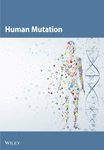Mutation analysis in 46 German families with familial hypercholesterolemia: Identification of 8 new mutations
Communicated by: Haig H. Kazazian, Jr.
Online Citation: Human Mutation, Mutation in Brief #226 (1999) Online http://journals.wiley.com/1059-7794/pdf/mutation/226.pdf
Abstract
In order to obtain a survey of the mutations being prevalent in Northern Germany and to enable molecular genetic testing for families with clinically diagnosed familial hypercholesterolemia (FH), we screened 46 unrelated German individuals with elevated LDL levels for mutations in the 18 exons and their flanking intron sequences including the promotor region of the LDL receptor (LDLR) gene. In addition, we tested all patients for the presence of mutations in the gene coding for apolipoprotein B-100 (apoB-100). We detected 15 mutations affecting the LDLR gene, 8 of which, designated A29S, 195insAT, 313+1insG, 553insG, 680insGGACAAATCTG, D200N, E267K and L411V have not yet been reported. One patient is heterozygous for the double mutant N543H and 2393del9Bp. Two patients carried the mutation R3500Q (Arg→Glu) within the apoB-100 gene. © 1999 Wiley-Liss, Inc.




